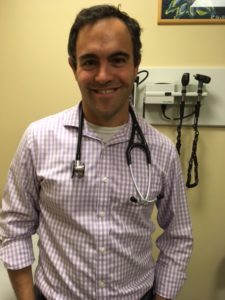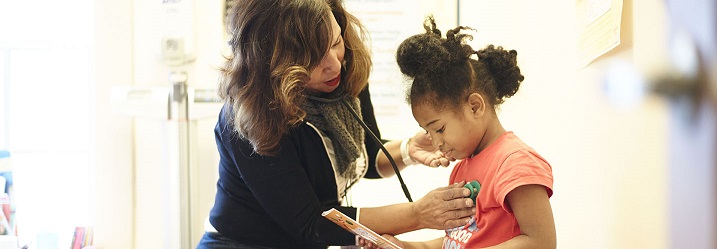January 19th, 2017
Interview with Jon Harris, PA-C — Health Care for the Homeless
Bianca Belcher, MPH, PA-C
I met Jon Harris, PA-C, during his days as a PA student at Northeastern University and was immediately impressed. He excelled in my course, and I knew that he was destined to be an impactful clinician. He previously had graduated from Columbia University with a degree in environmental sciences and spent several years working in the nonprofit, nonmedical community. On a friend’s advice, he started volunteering as an EMT in rural Vermont and quickly found a love for medicine. Jon now works for Boston Health Care for the Homeless Program (BHCHP) and makes a difference everyday in a medically challenging population.
BB: So, how did you become interested in BHCHP?
JH: Actually, I originally thought I wanted to go into oncology, and then I did a rotation during PA school at a state hospital for low-income patients and I loved it. I found the same type of challenging medicine that I sought with oncology, but in a unique population. I found that I connected well with the patients and felt like this was the work I wanted to do. I didn’t even know BHCHP existed but was introduced to the organization by a generous PA who helped me during my job search. It’s fascinating medicine, but more importantly, it is a venue where close relationships with patients make a difference. I find it satisfying to tune into the person in front of me and recognize if they need something like humor, time for silence, or just brutal honesty.
BB: Sounds like you really love the work, what’s your favorite part of the job?
JH: I really do. I love this job because it connects me to the beauty of another human being. Homeless people may appear disheveled on the street or arrive intoxicated for multiple visits to the emergency room, and these sorts of things unfortunately create distance between them and their medical providers. I have found, however, that when we speak to each other in the exam room and let pretenses and guardedness dissolve, patients communicate to me that they want the same things I do: loving relationships and a fulfilling life. Not only do we share similar dreams, but we also have the same shortcomings.
BB: You clearly have a passion for working with this population, but I’m sure — like with most jobs — there are challenges. What’s the most challenging aspect of working with the homeless population?
JH: Yes, I have definitely explored and discovered the boundaries of my compassion doing this work. For example, I took care of a young pregnant woman who was also addicted to multiple substances. She would repeatedly arrive at our clinic high, requiring us to send her to the OB/GYN clinic that specializes in pregnant women with addiction. Thinking of the injury she was repeatedly causing her unborn child made me furious. I forced myself to remember her awful childhood filled with its own abuse and addiction. This works sometimes, but not often. In the end, I recognize that with some patients I need to accept the sinking feeling of not knowing where to find empathy and do my best to treat the human being in front of me.
BB: That must be tough. Do you see illnesses on a regular basis in this population that most other clinicians don’t see that often?
JH: The team sees chronic illness at a greater severity than many other clinicians in other health care settings. For example, many of my diabetic primary care patients have a terribly high hemoglobin A1c with multiple complications: peripheral neuropathy, chronic kidney disease, limb amputations, etc. Because our patients often have an extensive problem list, we also face the challenge of managing heavy polypharmacy.
In addition to what I’ve already mentioned, we also see a lot of HIV, hepatitis C, cirrhosis, and addiction. These are usually related to alcoholism and IV drug use.
BB: Do you only see these patients in the clinic or urgent care?
I frequently am asked if we only provide urgent care to the homeless population. We actually provide primary care in quite unique settings. PAs work in shelters. Our workspace is literally a clinic embedded within a shelter. We have a Street Team that does rounds throughout the streets of Boston providing care to patients who prefer to stay on the street instead of the shelter, as well as a Family Team that works with homeless families.
BHCHP also has a 104-bed inpatient respite facility, the Barbara McInnis House, which is staffed mostly by PAs and NPs. We admit patients who are too sick to be on the street but not sick enough to be admitted to a hospital, such as someone with pneumonia or requiring perioperative care. I spend one day a week working at the Pine Street Inn, a shelter in Boston’s South End, and the remaining three days at the Barbara McInnis House.
BB: Wow! You have a lot of diversity in your job. What is one piece of advice that you’d give to someone looking to transition into working with the homeless population?
JH: I once asked a patient to give his advice on working with homeless people to a new provider I was orienting at BHCHP. His eloquent response best answers this question:
“I’ve been an alcoholic since my father gave me liquor when I was a kid. Please don’t think you’re going to cure my alcoholism. You’re not. Instead, I would really appreciate you taking the time to listen to me.”
BB: That’s incredible advice. Thank you for taking the time to chat with me and sharing what you do. I bet you have inspired some people to look into health care for the homeless.





Bianca, thank you for this wonderful article; and Jon thank you for your inspirational work!
I will carry the advice from your patient regarding empathy, not cure, with me for the rest of my life.
I will try to apply it in my daily interaction with patients as an AEMT back here at Essex Rescue in VT.
I didn’t have the pleasure of working with you Jon, but I hope you’ll come back to visit. You’ve left a positive impression on those remaining folks who did run with you; clearly well earned.
Cheers.
My work is primarily with Homeless Population in NE Massachusetts. Your comment on our common humanity as the key to your flourishing in the Homeless work is so insightful. We all share common needs for love and meaning. As such we can develop kinship as the basis for our compassion with those who live in the shadows, and not enter into our work with a sense of pity. The latter just creates a paternal distance which can never effect real change or communicate true love.
Peace in your work.
Vince Waite